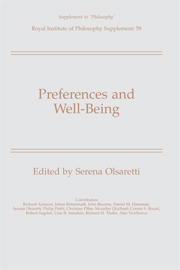Book contents
- Frontmatter
- Contents
- List of Contributors
- “Introduction”
- “Desire Formation and Human Good”
- “Preference Formation and Personal Good”
- “Leading a Life of One's Own: On Well-Being and Narrative Autonomy”
- “Well-Being, Adaptation and Human Limitations”
- “Consequentialism and Preference Formation in Economics and Game Theory”
- “Preferences, Deliberation and Satisfaction”
- “Content-Related and Attitude-Related Reasons for Preferences”
- “Reasoning with Preferences?”
- “Taking Unconsidered Preferences Seriously”
- “Preferences, Paternalism, and Liberty”
- “Preference Change and Interpersonal Comparisons of Welfare”
“Preference Formation and Personal Good”
Published online by Cambridge University Press: 07 May 2010
- Frontmatter
- Contents
- List of Contributors
- “Introduction”
- “Desire Formation and Human Good”
- “Preference Formation and Personal Good”
- “Leading a Life of One's Own: On Well-Being and Narrative Autonomy”
- “Well-Being, Adaptation and Human Limitations”
- “Consequentialism and Preference Formation in Economics and Game Theory”
- “Preferences, Deliberation and Satisfaction”
- “Content-Related and Attitude-Related Reasons for Preferences”
- “Reasoning with Preferences?”
- “Taking Unconsidered Preferences Seriously”
- “Preferences, Paternalism, and Liberty”
- “Preference Change and Interpersonal Comparisons of Welfare”
Summary
As persons, beings with a capacity for autonomy, we face a certain practical task in living out our lives. At any given period we find ourselves with many desires or preferences, yet we have limited resources, and so we cannot satisfy them all. Our limited resources include insufficient economic means, of course; few of us have either the funds or the material provisions to obtain or pursue all that we might like. More significantly, though, we are limited to a single life and one of finite duration. We also age, and pursuits that were possible at earlier points within a life may become impossible at later stages; we thus encounter not only an ultimate time limit but episodic limits as well. Because we must live our lives with limited resources—material and temporal—we are pressed to choose among and to order our preferences. Without some selection and ordering, few if any of them would be satisfied, and we would be unable to live lives that are recognizably good at all. Moreover, we would be unable to function well as the autonomous beings that we are. Our practical task then is to form a coherent, stable, and attractive ordering of aims—to develop a conception of our good.
The task is a complex one, for many of our conflicting preferences represent not merely the different things we might happen to want but the different selves we could become and the different lives we might lead.
- Type
- Chapter
- Information
- Preferences and Well-Being , pp. 33 - 64Publisher: Cambridge University PressPrint publication year: 2006
- 3
- Cited by



